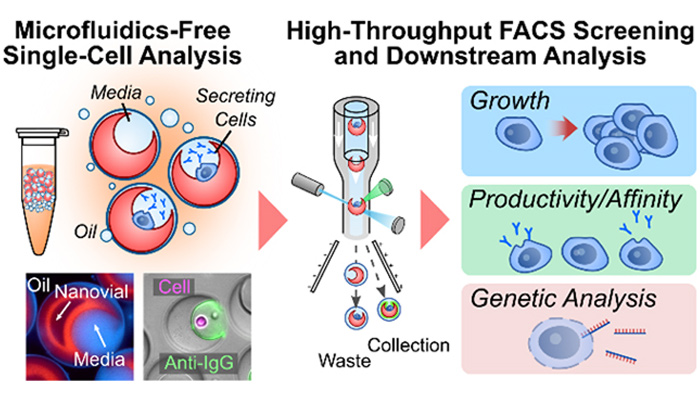
Suspendable Hydrogel Nanovials for Massively Parallel Single-Cell Functional Analysis and Sorting
Research Could Accelerate Development of Next-Generation Cell and Antibody Therapies
ABSTRACT: Techniques to analyze and sort single cells based on functional outputs, such as secreted products, have the potential to transform our understanding of cellular biology, as well as accelerate the development of next generation cell and antibody therapies. However, secreted molecules rapidly diffuse away from cells, and analysis of these products requires specialized equipment and expertise to compartmentalize individual cells and capture their secretions. Herein we describe methods to fabricate hydrogel-based chemically-functionalized microcontainers, which we call nanovials, and demonstrate their use for sorting single viable cells based on their secreted products at high-throughput using only commonly accessible laboratory infrastructure. These nanovials act as solid supports which facilitate attachment of a variety of adherent and suspension cell types, partition uniform aqueous compartments, and capture secreted proteins. Solutions can be exchanged around nanovials to perform fluorescence immunoassays on secreted proteins. Using this platform and commercial flow sorters, we demonstrate high-throughput screening of stably- and transiently-transfected producer cells based on relative IgG production. Chinese Hamster Ovary (CHO) cells sorted based on IgG production regrew and maintained a high secretion phenotype over at least a week, yielding >40% increase in bulk IgG production rates. We also sorted hybridomas and B lymphocytes based on antigen-specific antibody production. Hybridoma cells secreting an anti-hen egg lysozyme (HEL) antibody were recovered from background cells, enriching a population of ~4% prevalence to >90% following sorting. Leveraging the high-speed sorting capabilities of standard sorters, we sorted >1,000,000 events in less than an hour. IgG secreting mouse B cells were also sorted and enriched based on antigen-specific binding. Successful sorting of antibody-secreting B cells combined with the ability to perform single-cell RT-PCR to recover sequence information suggests the potential to perform antibody discovery workflows. The reported nanovials can be easily stored and distributed amongst researchers, democratizing access to high-throughput functional cell screening.
Researchers & Authors: Joseph de Rutte, Robert Dimatteo, Maani M. Archang, Mark van Zee, Doyeon Koo, Sohyung Lee, Allison C. Sharrow*, Patrick J. Krohl, Michael Mellody, Sheldon Zhu, James V. Eichenbaum, Monika Kizerwetter, Shreya Udani, Kyung Ha, Richard C. Willson, Andrea L. Bertozzi, Jamie Spangler, Robert Damoiseaux and Dino Di Carlo
*Allison C. Sharrow, PhD is a Prognosis:Innovation partner
FULL CONTENT Courtesy of The National Library of Medicine


